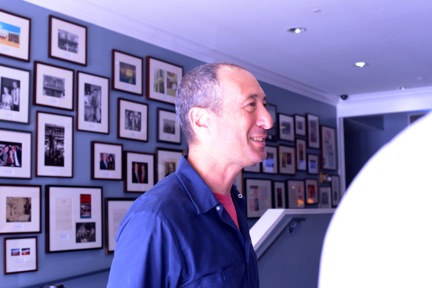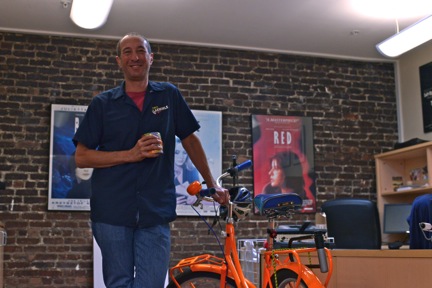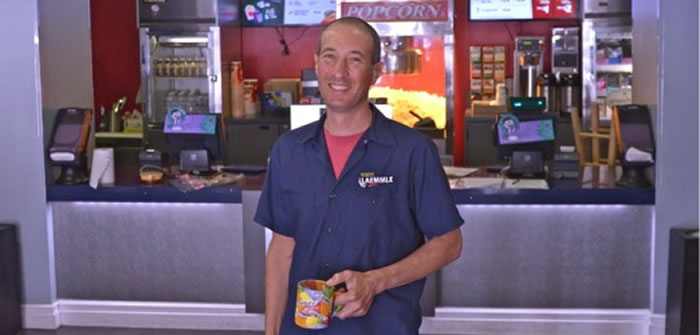In the age of Netflix, Hulu, and Amazon, along with a growing list of content streaming platforms, where does the movie theater fit in? I would argue, it fits in perfectly; in fact, I would insist that patronizing movie theaters is a necessity to the health and endurance of our passion for cinema. Consider this, which of those streaming services really provide the viewer with a sense of community while watching a film?
To examine the movie theater industry more closely, Conversations Without Borders sat down with Greg Laemmle, who along with his father Robert Laemmle, runs Los Angeles’ own Historic Laemmle Theaters. The company was established in 1938 by Kurt and Max Laemmle, nephews of legendary Universal Pictures founder Carl Laemmle.
Wyatt Phillips: Recently, just a couple days ago, Netflix had this huge deal with iPick Entertainment, one that would screen Netflix produced films in theaters same day as they come out on their streaming service, do you have any thoughts on that deal?
Greg Laemmle: Yeah, I saw something about it, I didn’t look too closely, I don’t know, I saw the other day Reed Hastings was saying that exhibitors are strangling the movie business, I suppose you could say the same about Netflix.
WP: That’s true—people are really looking for a way to bring content directly to viewers’ home, which takes away the whole traditional movie experience. What is still unique about movie theaters to you?
GL: Well, I mean, look, you’re- you separate from your life when you make the commitment to go to a movie theater. Thankfully, y’know, you could debate this, but the kind of expectation is that you don’t pay attention to your phone! [laughs] And you’ve made a commitment to the content that is clearly different from the commitment you make when you’re home. Even if you’re a real good home viewer, both in terms of the quality of your set up and your personal integrity, not paying attention to your phone, not getting up to pause it well you go to the bathroom or anything like that, there’s still less of a commitment at some level because you haven’t really blocked out that time to leave your nest, so to speak, and then beyond that, I think that the idea that you are in a public space, potentially with strangers, adds something to the experience and that’s why even as content becomes ever increasingly available, the movie going experience is always going to survive. When people ask, ‘well, what do you get when your seeing a theatre outside of your home vs. inside your home?’ the obvious answer is you’re out of your home! [laughs] We debate whether it’s of value, but it’s distinct, it’s definitely unique and it’s important to maintain.
WP: How do you see the future of movie theaters moving forward? Especially with the dawn of something like Virtual Reality technology. 
GL: To me, VR almost defeats the movie theater experience because a key component with me in the movie going experience is being with the audience and sensing the audience members around me. Now, all the sudden, I’m really in this self-contained environment [VR headsets]. I guess we’ll see, but part of the movie experience is your sort of consumed by the content, but you’re aware of everything else and you know you’re not in some kind of Virtual Reality.
WP: What are your thoughts on Dalian Wanda’s recent acquisitions over the past year, including Legendary Entertainment and AMC Theaters?
GL: I think it’s a recognition that exhibition and certainly content creation, that these are long term investments, I mean U.S. companies, well, I run a family business, so how much I can comment on corporate intrigue I’m unsure, but I think it’s a recognition that this is a business that has a future whether the returns are as sexy as some other businesses, I can’t say in the immediate future, but that there’s real long term potential here. People are going to continue to want the movie going experience and having a real footprint in that business is important.
WP: How do you see independent movies in the overall structure of making money at the box office? Do you see their pathway as being acquired at festivals or they should try to directly talk to theater owners and try to lobby them into showing their film?
GL: I think if you’re lucky enough to be acquired at a festival and that the acquisition price is such that you’ve been able to recoup on investment that you put into making the film, so that you’ve not locked yourself into a loss—I am a capitalist [laughs] So capital must be served, but if you can say, ‘okay, this is a fair deal, we’re going to make our money, and we’re going to have a professional team take us to the next stage now’, that’s absolutely valuable; because, it’s not that you can’t be both the film’s maker and peddler, but they are separate skill sets. So to work with an established distributor that has a good track record and feels passionate about your film, both from a financial standpoint, obviously if they’ve acquired it, they’re investing in it, but also just personally feel that they like it, that they have a way to connect it with an audience, that’s really valuable. If that doesn’t happen, it’s not the end of the road, there are still opportunities as an independent producer and filmmaker to connect your film directly, but you have to recognize you’re taking off your filmmaker hat, you’re putting on your film-seller hat, and you’re going to have that film seller hat on for a long time and while you’re doing that you’re not making your next film, especially in todays gig economy I think people are more and more used to that kind of thing. The DIY model does work and can work, but understand that as an independent producer trying to directly sell your film, you’re not going to be received as if your Fox Searchlight, you’re not going to exactly do the same business that Fox Searchlight is going to do with your film, you don’t have the resources that Fox Searchlight has, and you’re going to have to put your expectations at a different plateau, but it’s possible. At the end of the day, if you want your film in a theater, you can find a way to make that happen.
 WP: Does Laemmle theaters have any interesting upcoming film events that we should be aware of? I believe I saw one coming up for ‘Giant’.
WP: Does Laemmle theaters have any interesting upcoming film events that we should be aware of? I believe I saw one coming up for ‘Giant’.
GL: We have a number of different programs, we’re working with Stephen Farber from LA Film Critics Association to present the anniversary classics series and that’s films- classic Hollywood and foreign films having five and ten year anniversary’s that we can show, so yes, we recently had one for ‘Giant’, coming up we’re going to have ‘The Omen’ with Richard Donner, we’re going to have several of the cast members of ‘Cary’ because ’76 was a great year for horror! [laughs] But we’re also going to go back to our anniversary classics from 1941, ‘The Wolf Man’ for Halloween, we have our Throwback Thursdays Program that is not necessarily focused on what year it is, a Throwback Thursday is more ‘70s, ‘80s, even ‘90s, if it’s ten years old, we’ll do it, we have monthly themes, we did Kung Fu February. It’s an opportunity for filmmakers to see their favorite classics on the big screen, so we have that, and it’s currently only at our North Hollywood theater, but hopefully expanding to other venues. We have our Culture Vulture Program, which is for the live capture of presentations, we aren’t necessarily showing them live, but they’re films that have been captured live, exhibitions and things like that. Then there’s the Alt-content, I guess is what it’s generically referred to, it is a really interesting- growing and interesting market and again it’s an interesting model to follow for independent filmmakers. We know the dream is for the film to play a full week long engagement with five shows a day and so on and so forth, but from a financial standpoint, if you can go to a movie theater on a Tuesday night and pack one auditorium, that might be as many people that would see it in the course of an entire week, so for you, as a content creator, you’re financial benefit is the same, and for the exhibitor the financial benefit is much much better, because how much better is it to have a full auditorium on a night that might not normally be full than to have auditoriums that are almost empty the majority of the week? Groups like Tug and Gather work with independent filmmakers to make those kinds of things possible, but you can do it on your own as well!

